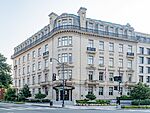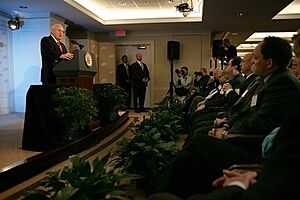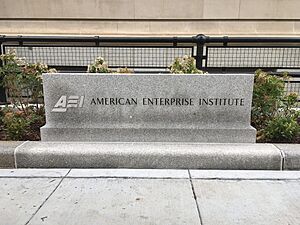American Enterprise Institute facts for kids
 |
|

AEI's headquarters near Dupont Circle in Washington, D.C.
|
|
| Abbreviation | AEI |
|---|---|
| Formation | 1938 |
| Type | Public policy think tank |
| Headquarters | Washington, D.C. |
| Location |
|
|
President
|
Robert Doar |
|
Revenue (2024)
|
$68 million |
| Expenses (2024) | $71 million |
The American Enterprise Institute for Public Policy Research, usually called the American Enterprise Institute (AEI), is a research group known as a think tank. It is based in Washington, D.C. and studies government, politics, economics, and social issues. AEI is an independent nonprofit organization, which means it is mainly funded by donations from foundations, companies, and individuals.
Founded in 1938, AEI is known for its conservative and center-right ideas. The group supports private enterprise (businesses owned by people, not the government), limited government, and democratic capitalism. It is led by a Board of Trustees and its president is Robert Doar.
Contents
History of AEI
How It Started (1938–1954)
AEI began as the American Enterprise Association (AEA) in 1938. It was started by a group of New York business leaders, including executives from well-known companies like Chrysler and General Mills.
At first, the AEA gave lawmakers in Congress reports and analysis on new laws. This helped them build relationships with important politicians like Melvin Laird and Gerald Ford. Later, the group began to focus more on studying government policies on topics like money, health care, and energy.
Growth and New Ideas (1954–1980)
William J. Baroody Sr. became the leader of AEI in 1954. Under his leadership, the group grew and started to focus on more specific topics. In 1962, the organization changed its name to the American Enterprise Institute (AEI) to make it clear it was a research group, not a business group.
During the 1964 United States presidential election, some AEI staff advised the Republican candidate, Barry Goldwater. This led to an investigation by the IRS, so after that, AEI tried to avoid looking like it was taking sides in politics.
In the 1970s, AEI hired many new researchers. Former President Gerald Ford joined as a "distinguished fellow" in 1977. He brought many of his former government officials with him, including Robert Bork and Antonin Scalia, who later became a Supreme Court Justice.
Baroody also invited scholars known as neoconservatives to join AEI. These thinkers were once supporters of government social programs but had become disappointed with them. They included people like Irving Kristol and Jeane Kirkpatrick. Kirkpatrick's writing at AEI caught the attention of Ronald Reagan, who later appointed her as the U.S. Ambassador to the U.N.
A Time of Change (1980–2008)
After Baroody Sr. retired, his son, William J. Baroody Jr., took over. During the presidency of Ronald Reagan, many AEI staff members went to work for the government.
In 1986, Christopher DeMuth became the new president and led AEI for 22 years. During this time, AEI became closely connected with the administration of President George W. Bush. More than 20 AEI staff members, including Vice President Dick Cheney, served in the Bush administration. President Bush once said, "I admire AEI a lot... After all, I have been consistently borrowing some of your best people."
AEI scholars also played a role in foreign policy. For example, some were associated with the start of the Iraq War. In 2006 and 2007, AEI staff, including Frederick W. Kagan, helped create the strategy for the 2007 troop "surge" in Iraq.
Recent Years (2008–Present)
Arthur C. Brooks became president in 2008. He wanted AEI to be more active in responding to the policies of the Obama administration. He focused on ideas like "compassionate conservativism" and finding ways to increase people's happiness.
In 2019, Robert Doar became the current president of AEI. He has continued to lead the organization in its research and policy work. In 2023, he led a group from AEI to visit Taiwan and meet with its president, Tsai Ing-wen.
What AEI Believes
AEI is a right-leaning think tank. It is often seen as a counterpart to the Brookings Institution, which is a left-leaning group. However, the two organizations have sometimes worked together on projects.
AEI is strongly associated with a political philosophy called neoconservatism. One of the founders of neoconservatism, Irving Kristol, was a senior fellow at AEI for many years. The institute even gives out an annual award named after him.
The institute also has close ties with some politicians in the British Conservative Party who supported Brexit.
According to a 2011 report from the University of Pennsylvania, AEI was ranked as one of the top 20 think tanks in the world.
What AEI Studies
AEI's research is divided into several areas, including economic policy, foreign policy, health care, and education.
Economic Policy
Studying the economy has always been a core part of AEI's work. AEI scholars believe in free economies and want to find ways to make them stronger. They often support policies like tax cuts to help the economy grow.
During the 2008 financial crisis, some AEI scholars pointed out that they had warned about problems with government-sponsored housing companies like Fannie Mae and Freddie Mac. However, others have disputed this, saying that AEI's explanation of the crisis was not accurate.
Foreign and Defense Policy
AEI's foreign policy experts study how to promote freedom and American interests around the world. They have often recommended a strong stance against countries and groups they see as threats to the United States.
The institute is known for its neoconservative views on foreign policy. Scholars like Richard Perle and Paul Wolfowitz have been influential in this area. As mentioned earlier, AEI played a key role in developing the "surge" strategy during the Iraq War.
Climate and Energy Policy
AEI's work on climate change has been controversial. Some of its scholars have been critical of the findings of the Intergovernmental Panel on Climate Change (IPCC), the main international group that studies climate change.
In 2007, reports claimed that AEI offered money to scientists to argue against the IPCC's conclusions. AEI has denied these claims. The institute has received funding from oil companies like ExxonMobil, which has led to criticism. Some AEI scholars have supported a carbon tax as a way to address climate change, which is a tax on carbon emissions.
Health and Education Policy
AEI has studied health care for many years. Its scholars often support market-based solutions, where competition and consumer choice are used to improve the system. They have researched topics like Medicare, Medicaid, and the cost of health care.
In education, AEI scholars like Frederick M. Hess study ways to improve American schools. They often support ideas like school choice and new ways of holding schools accountable for student success.
Funding Sources
AEI is a nonprofit organization and gets its money from donations. Its funders include foundations, corporations, and individuals.
Some of its major donors have included the Donors Capital Fund, the Kern Family Foundation, and foundations associated with the Koch brothers. It has also received funding from companies like Purdue Pharma, the maker of the pain medication OxyContin. This has led to some controversy.
See also
- List of American Enterprise Institute scholars and fellows
- Francis Boyer Award
- Irving Kristol Award
 | Janet Taylor Pickett |
 | Synthia Saint James |
 | Howardena Pindell |
 | Faith Ringgold |



